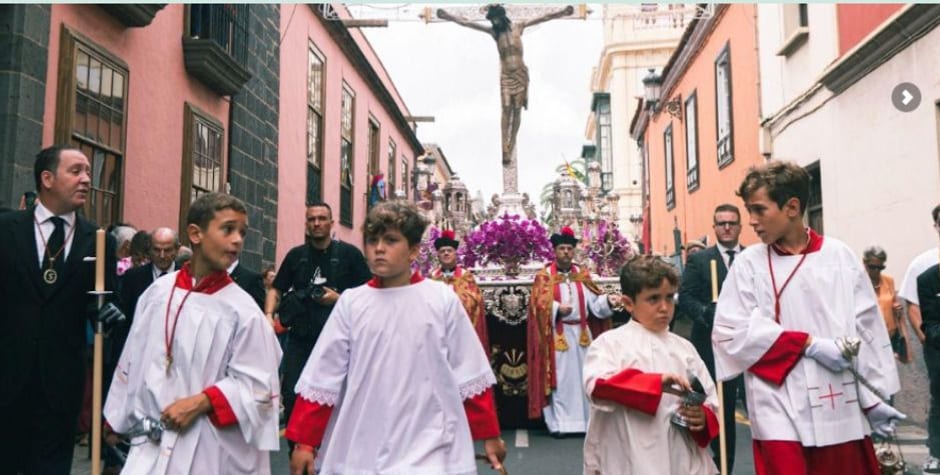

Spain's Constitutional Court Imposes Women on a Male Religious Brotherhood
Spain's Constitutional Court Imposes Women on a Male Religious Brotherhood
On November 13, 2024, Spain's Constitutional Court handed down a long-awaited ruling (STC 132/2024) on an appeal lodged by a certain María Teresita Laborda Sanz. Her request: to join the “Pontificia, Real y Venerable Esclavitud del Santísimo Cristo de La Laguna”, a religious brotherhood organizing devotional activities in La Laguna (Canary Islands). Problem: she's a woman, and the brotherhood is for men only. Her application alleged a violation of the right to equality and non-discrimination on grounds of gender (art. 14 Spanish Constitution, hereinafter SC) as well as of the right of association (art. 22 SC).
By Nicolas Sanchez.
Photo: Event of September 14, 2023 of the Pontifical, Royal and Venerable Slavery of the Holy Christ of La Laguna. Source here.
Facts and procedure
At first instance, Ms Laborda brought an action for the annulment of article 1 of the Statute of the Brotherhood. This article defined the Brotherhood as an association of men. The court ruled in favor of the petitioner, declaring the statutory clause excluding women to be null and void.
The brotherhood subsequently appealed this decision, arguing that its male membership was protected by its right to religious freedom (art. 16 SC) and autonomous self-organization (art. 6 Ley Órganica de Libertad Religiosa, LORL). However, the Provincial Court upheld the first-instance judgment, upholding the nullity of the statutory article.
The Brotherhood disagreed with these rulings and lodged an appeal in cassation with the Supreme Court. The Brotherhood argued that its activities were exclusively religious and that its autonomy was protected by religious freedom. It denied that the exclusion of women constituted discrimination, defending its right to establish admission criteria. The Supreme Court upheld the appeal in cassation, annulled the previous decisions and rejected Ms Laborda's claim, ruling that the brotherhood did not infringe fundamental rights, its activities being protected by religious freedom.
This did not discourage Ms Laborda, however, and she lodged an appeal for “constitutional protection” (recurso de amparo) with the Constitutional Court (Tribunal Constitucional de España). She argued that the exclusion of women from the brotherhood constituted a violation of their freedom of association and direct gender discrimination, contrary to article 14 of the Spanish Constitution. The Public Prosecutor's Office supported the appeal, arguing that the exclusion lacked a reasonable basis and infringed the right to equality and non-discrimination.
The Constitutional Court upheld Ms Laborda's appeal for constitutional protection, declaring that her fundamental rights to equality and freedom of association had been violated, and annulling the Supreme Court's decision. The Constitutional Court also declared null and void the article of the Statute that excluded women.
Case law that ignores the autonomy of religious organizations
In Spanish law, articles 16.3 SC and 6 LORL refer to the institutional dimension of religious denominations and their autonomy, protecting their capacity for self-normativity and self-organization: internal regime, personnel regime, own structure. This derives from the collective religious freedom of denominations and the individual freedom of their members, a condition for the free development of personality (article 10.1 EC).
In principle, only religious denominations are competent to regulate matters of their own interest, in which they are autonomous from the State. This autonomy is an institutional guarantee for religious denominations under Spanish law.
Consequently, any conflicts that may arise in these areas must be settled in accordance with their own norms, without the possibility of applying State law, even if it is of constitutional rank. This regime was validated by the Grand Chamber of the European Court of Human Rights in Fernández Martínez v. Spain (2014), concerning the dismissal of a Catholic religion teacher at a state secondary school.
Thus, the Spanish Constitutional Court's ruling calls into question the autonomy of religious denominations and communities, an essential dimension of the right to religious freedom under Spanish and international law.
Rejection of the diocese's arguments
The arguments of the Diocese of Tenerife, summarized in part 7, a) of the judgment, go in this direction, stressing that the correct assessment of the case requires respect for the right to religious freedom, as required by article 16 of the Constitution, since it is an association with exclusively religious objectives. In this association, “the cultic, the religious, is fundamental, while the cultural is merely accessory. Consequently, we find ourselves in an area where the State must remain neutral, not only by respecting the area of freedom of self-organization of the association, but also by guaranteeing the scope of religious freedom, with no other limit than that necessary for the maintenance of public order protected by law, in its manifestations.”
In point 4 of the Legal Basis, the Constitutional Court explains, on the contrary, that the non-admission of women to the brotherhood is not considered to be justified on religious grounds. Consequently, the statutory rule prohibiting women from joining does not enjoy the protection of the fundamental right to religious freedom.
A different interpretation would have led to a different conclusion. Based on the principle of the autonomy of religious denominations, the judges should logically have concluded that this rule was protected by religious freedom. As the brotherhood was a religious association, its internal rules were part of its freedom of self-organization.
The relationship between freedom of association and religious freedom
In section b) of point 4, the Constitutional Court approaches the case from the point of view of the fundamental right of association recognized by article 22 SC, considering that a canonical association is a mere sub-category of “associations”.
This is questionable for several reasons, the first being that a canonical association, created according to the rules of the Church, cannot be treated as a mere generic association falling within the scope of article 22 of the Spanish Constitution, which protects the right of association in general. Canonical associations are not simply sub-categories of generic associations. On the contrary, they enjoy specific protection linked to their religious character, guaranteed by the fundamental right to religious freedom in article 16.1 of the Constitution. Moreover, article 2.1, d) of the LOLR clearly states that religious association is an expression of the right to religious freedom.
Another frequent argument in the judgment is that of the brotherhood's “position of domination” in the municipality's cultural and social action, due to its role in organizing processional acts and activities linked to the image of the Holy Christ. This argument is irrelevant, as it is based on the idea that a public authority would be legitimate to intervene in a strictly religious matter in order to put the religious at the service of cultural and social motives.
The Constitutional Court's ruling puts a definitive end to the jurisdictional process in Spain. All that remains now is for the international courts to reverse such an abusive application of the principle of non-discrimination.











